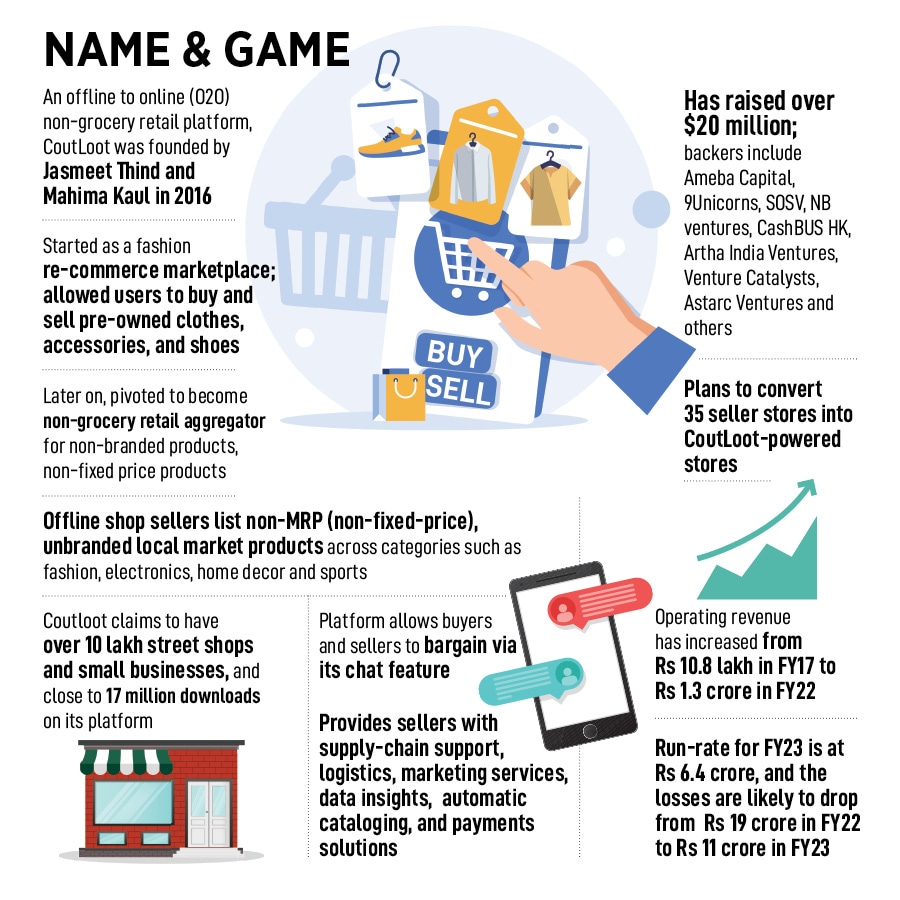How CoutLoot helps you bargain and sell with a click
A fortuitous pivot, propelled by heady pandemic tailwinds, has made CoutLoot gallop at a brisk pace. The big task now is to cut down losses and grow sustainably


Mumbai, 2016. If an engineer joins a soap brand, it is natural to expect some kind of ‘cleansing’ reaction. This is what happened with Jasmeet Thind. He joined FMCG giant HUL in July 2013, worked with Pears for close to three years, and by the time he decided to move on in February 2016, the young lad from Mumbai believed that his cluttered mind got cleansed, and amassed enough clarity to peep into the future. Well, it looked like the tagline of the soap brand—It is so pure that you can actually see through it—was playing on the minds of Thind. Towards the second half of 2016, he teamed up with a bunch of his friends and rolled out CoutLoot, a fashion re-commerce marketplace.
The idea was nothing less than a cleansing act. Thind and his team positioned themselves as ‘closet managers’, and offered a platform that allowed users to buy and sell pre-owned clothes, accessories, and shoe brands. The re-commerce space looked promising. A clutch of upstarts such as Rekinza, Envoged, Elanic, Spoyl, and Zapyle were already in the fray, making most of the trend among youngsters who wanted to satiate their aspirations to use branded stuff without burning a hole in their pockets. Thind was the latest one to join the party.
CoutLoot’s party indeed had an early start. Within a few months of rolling out, it reportedly managed an inventory of over 6,000 clothes, saw a daily listing of 300-400 on its platform, and was clocking around 50 orders every day. Funders sensed a big opportunity, and CoutLoot got its seed funding in 2016. Two years later, in early 2018, the startup raised $1 million in pre-series A funding. The venture seemed like a perfect blend of commerce and re-commerce.

Then came the pivot. A chance trip to China towards the end of 2018 made Thind take a U-turn. From branded, Thind started to look at unbranded products from top cities, he now wanted to move into Tier II and beyond and from end users—consumers—he decided to tap into retailers. CoutLoot now got transformed into an offline to online (O2O) non-grocery retail platform for non-branded and non-fixed price products. Offline sellers list non-MRP (non-fixed price), unbranded products across categories such as fashion, electronics, home decor and sports, CoutLoot provides sellers with supply-chain support, logistics, marketing services, data insights, automatic cataloguing, and payments solutions, and the ecommerce platform allows buyers and sellers to bargain and close the deal via a chat feature. “That’s how Bharat shops," he says, adding that, in the first twelve months, the startup exhibited missionary zeal in bringing offline sellers to online.
The results were encouraging. Operating revenues jumped from Rs 10.8 lakh in FY17 to Rs 52.8 lakh in FY20. But then came the pandemic. First, there were dark clouds, and then the silver lining emerged. The offline world scrambled to have an online presence, and Covid tailwinds propelled Thind’s venture. Coutloot closed FY22 at Rs 1.3 crore, and is all set to close FY23 at an operating revenue of Rs 6.4 crore. Losses, claims Thind, are set to come down from 19 crore in FY22 to around Rs 11 crore in FY23. The startup has raised over $20 million so far and counts Ameba Capital, 9Unicorns, SOSV, NB ventures, CashBUS HK, Artha India Ventures, Venture Catalysts and Astarc Ventures among its backers.
In terms of scale too, the growth has been brisk. Coutloot claims to have over 10 lakh street shops and small businesses, and close to 17 million downloads on its platform. “The non-grocery retail market in India is estimated to be at $300 billion. That’s the big opportunity we are chasing," says Thind.
The backers, for their part, are bullish on India’s story. “We believe the consumer side of digitalisation in India has the biggest potential," reckons Kevin Wang, managing partner of Ameba Capital. “It has the potential to get to the same scale that we’ve seen in China and South East Asia, and will steadily outrun everyone as we believe in the Indian story," he adds. The founders of Coutloot, Wang reckons, have the right background to build deeper in India. As a long-term partner, the investor adds, Ameba will stay put for at least 15 years as India continues with its rapid march in consumption.
Wang points out the gaps in the Indian market, and the opportunity. The lower medium tier of ecommerce market in India is not well served, and is constrained by local supplies and paucity of demand. Coutloot, he claims, has enhanced its supply capabilities by digitising and connecting local shops to factories. “This will fundamentally change the ecommerce landscape powered by retail, which is the backbone of India’s consumption," he adds.
Despite the massive opportunity, there are challenges galore for the retail tech platform. Wang underlines one of them. A low GDP per capita and inequality of wealth distribution is hindering the pace of growth of ecommerce in the country. For CoutLoot, he maintains, it’s a play of scaling and scaling fast enough to go beyond just one layer of commerce and creating the right moat. Then there are challenges of bringing down the losses to ensure sustainable growth, and also figuring out the business equation when millions of consumers upgrade to an aspirational life and move from unbranded to branded products.
Thind reckons the unbranded story has a long tail. Being a price-sensitive market, most consumers will prefer price over aspiration. The big Indian consumption story is playing out in smaller towns, cities, and villages where affordability still rules the roost. “For every Burger King and McDonald’s in a city, there is a local bun and patty player selling the stuff on a roadside cart or a small shop," he says. What if local players start building their own brands, he asks. “This is what CoutLoot wants to do," he says.
First Published: Mar 20, 2023, 13:17
Subscribe Now